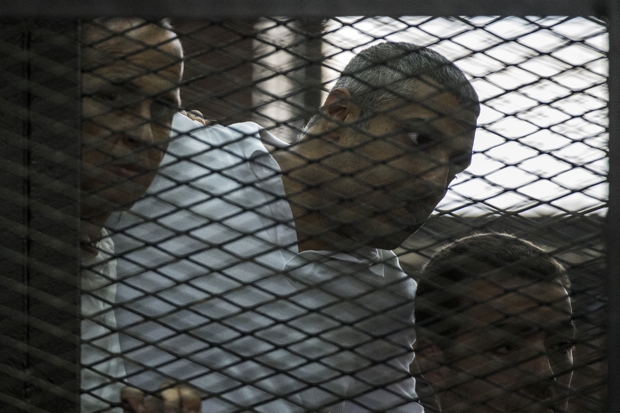Next year Al Jazeera English (AJE) will celebrate its 10th anniversary. It was launched to great fanfare in 2006 luring across the brightest and best in the industry with a chequebook that compensated for ratings. Refreshingly, it offered viewers both an alternate global perspective along with ‘fearless reporting’.
To a large extent it has fulfilled these promises. It reports from areas untouched by more western-centric channels, and its journalists haven’t flinched from what this might entail. Despite the recent release of Peter Greste, two more remain imprisoned in Egypt where they have languished for more than 400 days.
Yet there is more to fearless reporting than braving bullets or repressive governments. It also involves a moral choice about what and how you choose to report. Depressingly, on the rise of Islamism in all its manifestations, AJE has chosen not to be fearless – rather it has chosen to be silent.
Recent editorial guidelines make this clear. The AJE ‘Style Guide’, which defines itself as the ‘rule book of the newsroom’, is emphatic that the term ‘Islamist’ is not to be used. An online clip elaborates that AJE journalists are not to use this term when describing particular groups. Rather they should let the activities of the group ‘speak for themselves’.
The justification given for this editorial policy is that to apply the same label to the Muslim Brotherhood and Boko Haram would be inappropriate. Furthermore, the term is to be avoided as some viewers find it pejorative.
The exact definition of any ideology is always going to be open to debate, however, using the term Islamist to describe a Muslim who believes society should be governed within the laws of Islam is widely accepted. While the Muslim Brotherhood and Boko Haram are two very different organisations the term Islamist can be legitimately applied as both hold this belief as a core tenet.
For the Muslim Brotherhood the Qur’an and Sunnah are the, ‘sole reference point for everything relating to the ordering of the life of the Muslim family, individual, and community as well as the Muslim State all economic, social, political, cultural, educational, and also legislative and judiciary activities’. Additionally, Article 1 of their constitution calls for ‘the introduction of the Islamic Shari’ah as the basis controlling the affairs of state and society’. Similarly, Boko Haram believe Sharia law should be applied across an Islamic Nigeria.
They are, therefore, Islamist and not to describe them as such, or provide a lengthy extrapolation of their guiding principles, is a failure to provide context. It is not enough to let their ‘actions speak for themselves’. That is to report on the what but not the why. The underlying fear that viewers will come to associate Islamists with terrorism has led to a ludicrous inversion of the proposition; viz. that terrorists can’t be Islamists.
It is inconceivable that the AJE editorial team would similarly proscribe the words capitalist, fascist or Zionist because of their amalgamous definitions. Or that they would dispense with the term communist because of the disparity – despite a shared Marxist ideology – between various political organisations. Yet this is what their decision to censor the term Islamist amounts to, and it is symptomatic of a deep contradiction within AJE.
Based in Qatar, a country whose constitution states that ‘Shari’a law shall be the principle source of its legislation’, AJE is funded by the ruling al-Thani family. As such, it pitches its dynamic and liberal reporters against more conservative colleagues and their political pay masters.
The inevitable tensions this causes were obvious in a leaked email exchange, among staff debating their response to the Charlie Hebdo massacre, even if the subsequent reporting established beyond doubt which side prevailed.
The murder of fellow journalists swiftly became a story about the War on Terror, the rise of the far right, colonialism, western anti-terrorist legislation; anything other than the right of European citizens to freely denigrate religion. Talking heads queued up to pronounce the cartoons as deliberately racist although at no stage were viewers allowed to decide this for themselves.
When Douglas Murray, appearing on Inside Story, expressed a desire not to live under 7th century blasphemy laws, the presenter Sami Zeidan accused him of belonging to the far-right.
Perhaps this should have come as no surprise. In the past, AJE has not always achieved the honesty, fairness and balance stipulated in its Code of Ethics. It has manipulated raw footage to distort the actions of protagonists, its contributors know which subjects they can and cannot address and, at times, it does pursue an undeniable anti-west bias as demonstrated recently when covering the false accusations of abuse made against the British Army in Iraq.
Yet this is not to say the AJE is not without real merits. It can be genuinely interesting and informative to watch and it avoids the US/European parochialism of many of its competitors. Similarly, it’s not as if its competitors are without fault. Those of Fox News are becoming the stuff of legend.
In other words it behaves much like any other news channel in that it does some things well and others badly. When it was founded, AJE claimed it would avoid the collusion between press and government that afflicted its western counterparts. Inevitably, perhaps, AJE merely imbued a differing form of influence which its viewers can accept or disregard as they see fit.
However, the issue of AJE’s inability to address the existence of Islamism, let alone its violence, is bigger than mirroring the faults of its rivals. Not only is a rejection of the station’s founding principles but given its geographical provenance, and self-declared expertise, it’s a striking admission of irrelevancy.
As AJE starts to reflect on its 10th anniversary, its reporters should refer back to the phase ‘fearless journalism’ and ask themselves exactly what it is they are afraid of.
Crispian Cuss is a former British Army officer who has worked and lived in the Middle East






Comments